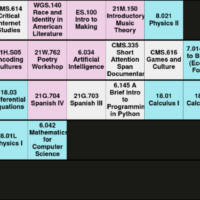MIT believes the best education occurs when students are self-motivated and engaged participants in a dynamic community of learners. We combine rigorous academics with a learning-by-doing approach.
Our guiding principles
Since the first classes were offered in a storage warehouse in Boston’s Back Bay, much has changed about the MIT education: electric lights have replaced oil lamps, mechanical engineering succeeded steam engineering, and students are no longer required to learn French and German01 Though they are offered, of course! in order to graduate. However, the MIT education has always been based on certain principles that guide us even today. These include:
- a broad and strong foundation in core fields of human knowledge (implemented by the General Institute Requirements)
- a deep and skillful training in a particular area of expertise (obtained through your major(s) and courses of study)
- a practical orientation toward solving real-world problems (produced by our research and innovation)
MIT also tends to attract and nurture unconventional thinkers.02 As the <a href="https://libraries.mit.edu/mithistory/institute/committees/committee-on-educational-survey/" target="_blank" rel="noopener">Lewis Report</a> put it long ago: “We believe that the mission of the Institute should be to encourage initiative, to promote the spirit of free and objective inquiry, to recognize and provide opportunities for unusual interests and aptitudes; in short, to {develop} individuals who will contribute creatively to our society, in this day when strong forces oppose all deviations from set patterns.” This is intentional: we seek students (and faculty) who have courage, creativity, and curiosity, place them in a resource-rich environment, and let them pursue their interests. And we believe these principles of our education empower our students long after they leave MIT.
- Though they are offered, of course! back to text ↑
- As the Lewis Report put it long ago: “We believe that the mission of the Institute should be to encourage initiative, to promote the spirit of free and objective inquiry, to recognize and provide opportunities for unusual interests and aptitudes; in short, to {develop} individuals who will contribute creatively to our society, in this day when strong forces oppose all deviations from set patterns.” back to text ↑



